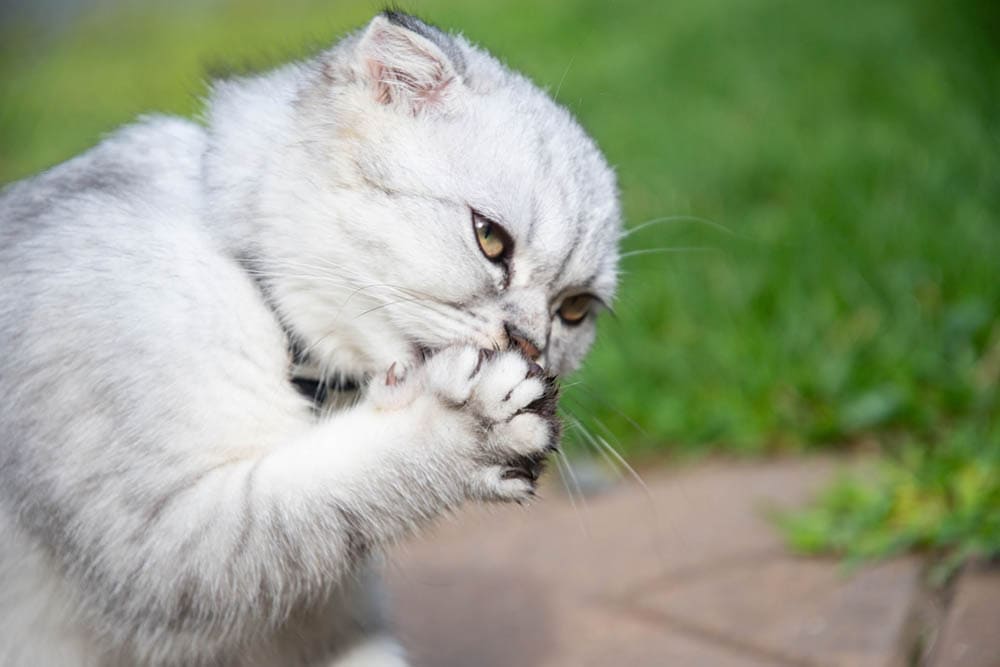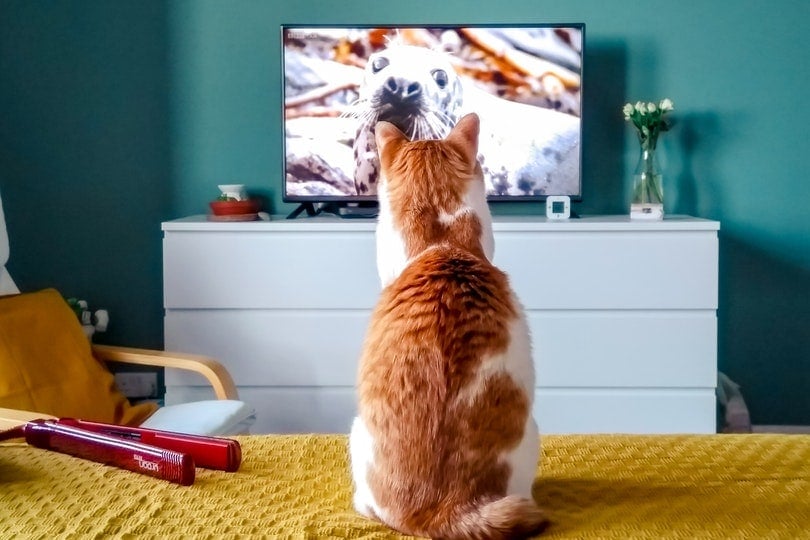How Long Do Savannah Cats Live? Average Lifespan, Data & Care
By Jessica Kim
Updated on
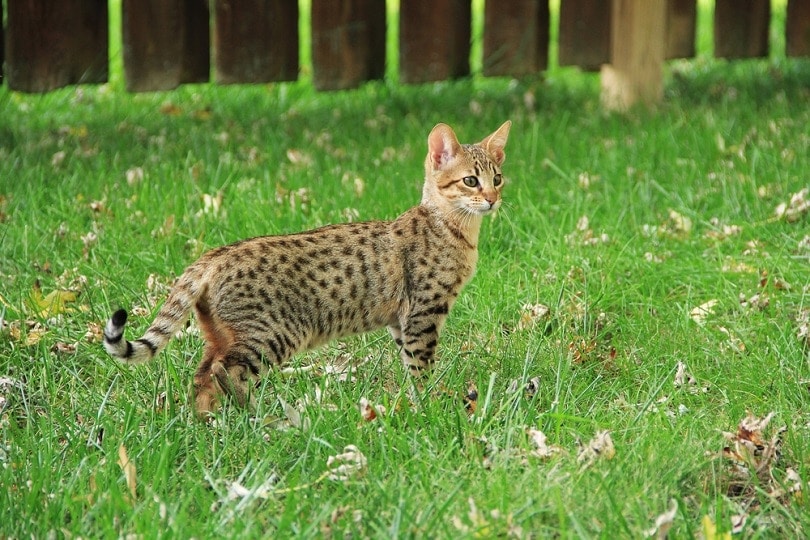
Click to Skip Ahead
Savannah cats are beautiful feline with an exotic appearance due to their African Serval ancestry. This cat breed is relatively new, so more data must be collected to determine its average lifespan. However, Savannah cats are most commonly known to live between 12–20 years.
Many different factors can affect a Savannah cat’s lifespan. Here’s an in-depth exploration of what can impact a cat’s aging process as they grow and develop.
What’s the Average Lifespan of a Savannah Cat?
Savannah cats are known to live for about 15 years, but many can live closer to 20 years. It’s possible for these cats to live long lives because of their generally healthy pedigree, and African Servals in captivity are capable of living around 20 years.
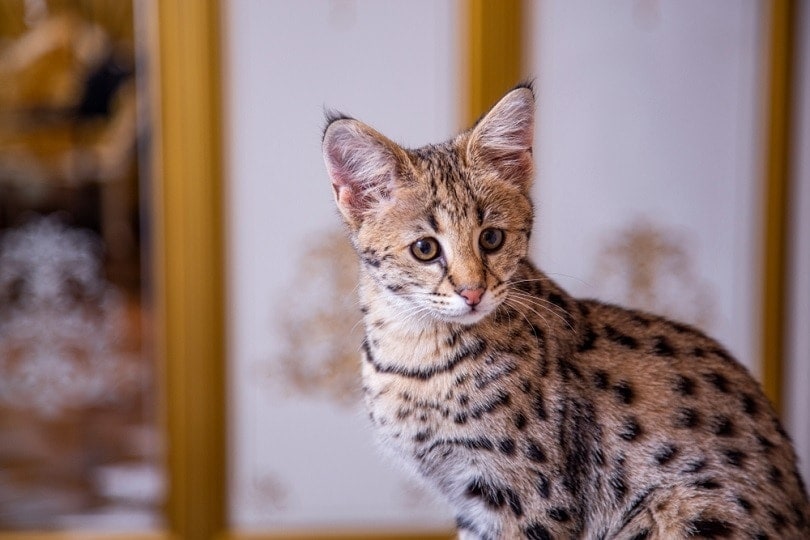
Why Do Some Savannah Cats Live Longer Than Others?
1. Nutrition
Savannah cats have different nutritional requirements for each life stage, so a kitten’s diet will look different from an adult cat’s diet. Kittens typically require a lot more energy and often need to consume more protein. They also need more amino acids, minerals, and vitamins to support healthy growth and development.
Savannah cats need adjustments made to their diets when they reach their senior years. As they become less active, they’ll benefit from food that has lower amounts of protein. Many senior cat food is also enriched with antioxidants and nutrients that support joint and mobility health.
While high-quality cat food won’t guarantee that a Savannah cat will live a certain amount of years, it can definitely play a role in improving and maintaining its health. A healthy diet and appropriate feeding proportions can reduce the risk of chronic illnesses like heart disease, diabetes, and obesity.
2. Environment and Conditions
All Savannah cats need to feel safe and secure in their homes. Generally, indoor cats live longer than outdoor cats. Stress and restlessness can also reduce a Savannah cat’s lifespan, so it’s important for them to live in homes that meet their daily needs.
Exercise is especially important for Savannah cats, especially Savannah cats in higher generations with more African Serval in their pedigree, like F1 to F3 Savannah cats. Savannah cats are energetic and need daily exercise. They can get exercise through play and often enjoy interactive treat-dispensing toys.
Despite their large size, Savannah cats like to climb and will benefit from cat trees and other types of vertical spaces. Vertical spaces, like hammocks and window perches, aren’t just places where Savannah cats can jump from and climb. They also provide safe spaces where they can hide and observe and rest without any disruptions.
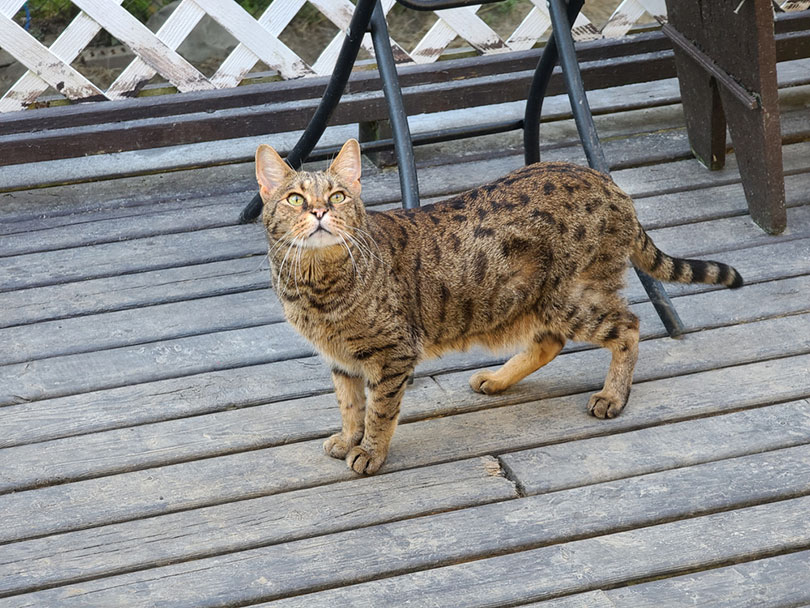
3. Size
There isn’t sufficient data that definitely states that a Savannah cat’s generation is correlated to its lifespan. While larger dogs tend to have shorter lifespans than smaller dogs, a cat’s lifespan isn’t as heavily dependent on its size.
So, it’s possible that F1 and F2 Savannah cats may have shorter lifespans because they tend to be bigger. However, they aren’t consistently known to live significantly shorter lives than other generations of Savannah cats.
4. Sex
Sex plays some sort of a role in a Savannah cat’s lifespan. Female cats are known to have longer lifespans than male cats and can live for a couple of years longer. Cats that have been spayed or neutered also have an increased chance of living longer than intact cats.
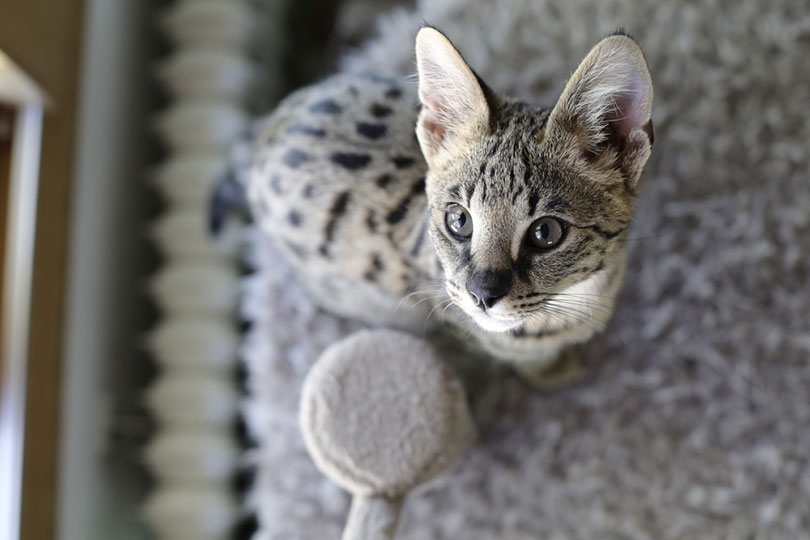
5. Genes
A cat’s genetics can also play a role in its lifespan. In general, crossbred cats live longer than purebred cats. While the Savannah cat received Championship Status from The International Cat Association (TICA), it’s not actually a purebred cat. It’s possible that Savannah cats can exceed the average lifespan of cats because it’s a cross between an African Serval and a domestic cat.
6. Breeding History
The Savannah cat is protected by the Savannah Cat Association, and you can find many reputable breeders through this nonprofit organization. Many breeders have careful and ethical breeding programs that help to preserve and grow the Savannah cat population.
Ethical breeding helps to protect the breed and produce healthy litters. So, in many ways, a Savannah cat’s lifespan can be affected by factors that exist before birth.
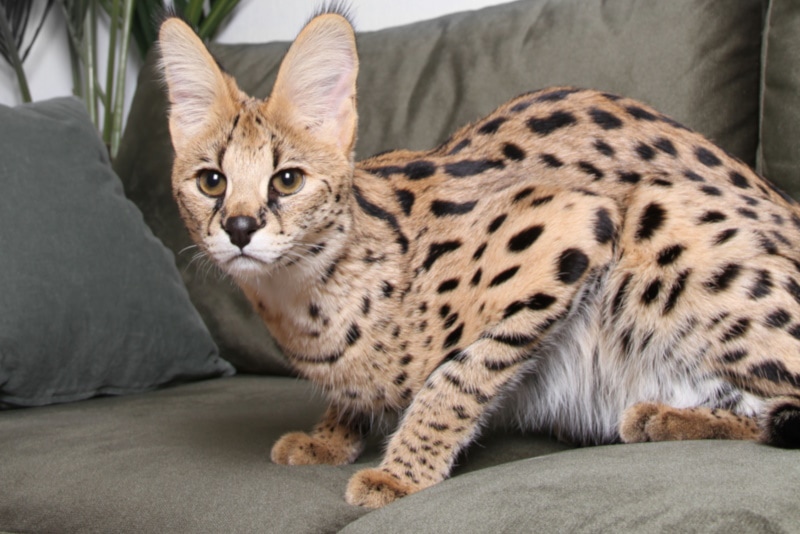
7. Healthcare
A veterinarian’s relationship with a pet owner can affect the well-being of a pet’s quality of life. Pet owners with a good relationship with their veterinarians are more likely to schedule routine care visits and contact them for consultations and health-related questions.
Having the guidance of a veterinarian can help prevent the development of some chronic illnesses with routine exams and early detection of diseases. Veterinarians that are familiar with caring for exotic cats can also help Savannah cats live long and healthy lives as they may exhibit behaviors that are more closely aligned with exotic cats.
The 4 Life Stages of a Savannah Cat
1. Newborn
Most Savannah cats will be in the newborn stage for about the first 8 weeks of their lives. These kittens are born blind and completely dependent on their mothers. They’ll need their mother’s help with feeding, going to the bathroom, and warmth.
Newborn kittens also go through a lot of physical and behavioral development during this time. They’re born without being able to see or hear, and they rely on milk for nourishment.
2. Kitten
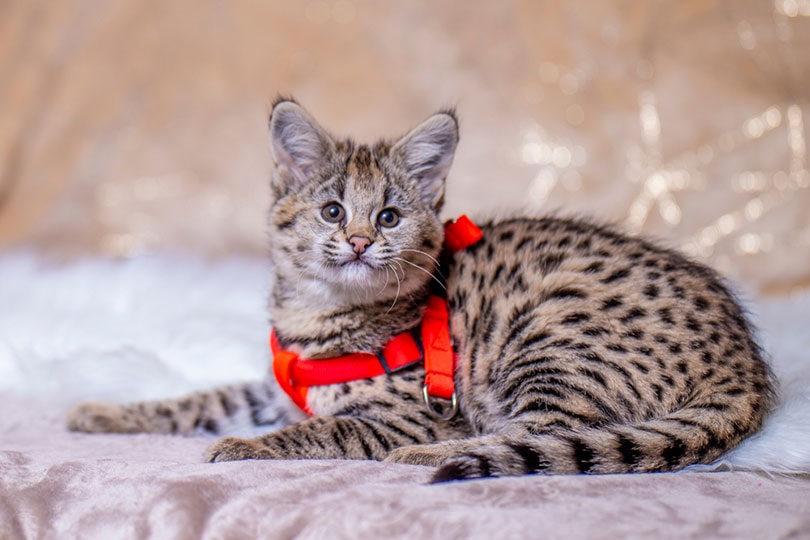
Around the time a Savannah kitten reaches 8 weeks old, it’ll look and behave completely different from when it was first born. Its eyes will be open, and it can hear. It will also have all its baby teeth present, and it’ll be more curious and mobile. They’ll also start to transition to eating solid food.
Savannah cats typically stay in kittenhood and young adulthood until they’re about 12 to 16 months old.
3. Adult
Adult Savannah cats are usually more active than average, so they’ll remain energetic for many years. It’s important for them to have plenty of protein and fat in their diets to match their high activity level.
Savannah cats typically stay in adulthood for about 10 years. You may start to notice changes in their activity, and some may develop minor health issues. Not all Savannah cats will enter older adulthood at the same time, so it’s important to communicate with your veterinarian and observe its aging together to determine when it’s time to make adjustments for its senior life stage.
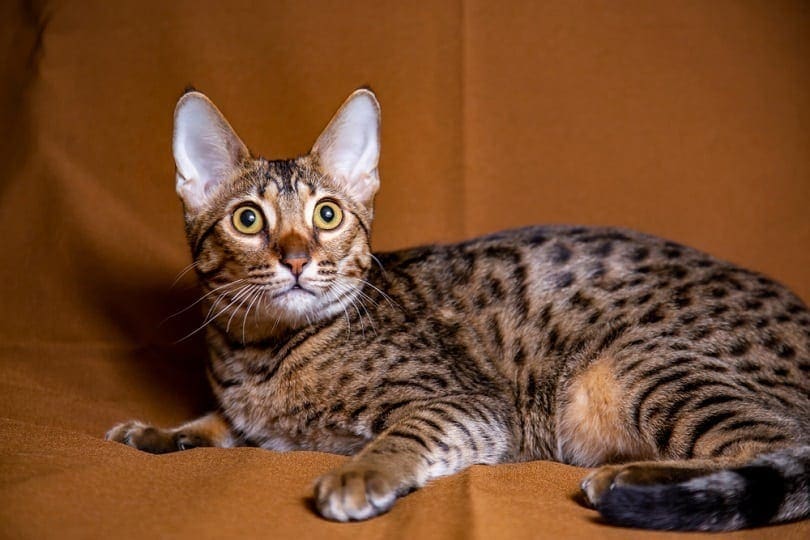
4. Senior
Savannah cats can still live for several years after they reach older adulthood. They’ll be noticeably less active, so you’ll have to make adjustments to their diet to reduce their protein intake.
Savannah cats may need some help with self-grooming, and they might have to be brushed more frequently. It’s also important to make resting places more accessible by lowering their positions and creating safe places of refuge closer to the ground.
How to Tell Your Savannah Cat’s Age
There are several ways you can identify a Savannah cat’s age. Kittens and young adults will typically continue to gain weight and grow until they’re about 3 years old. Young cats that are between 1 to 2 years old will have less tartar buildup on their teeth.
When cats start reaching older adulthood, their eyes often appear cloudier because their eye lenses become denser. Older cats may also lose their ability to self-groom if they develop arthritis or muscle pain.
One of the best ways to get a good estimate of a Savannah cat’s age is to take it to a veterinarian for a full examination.
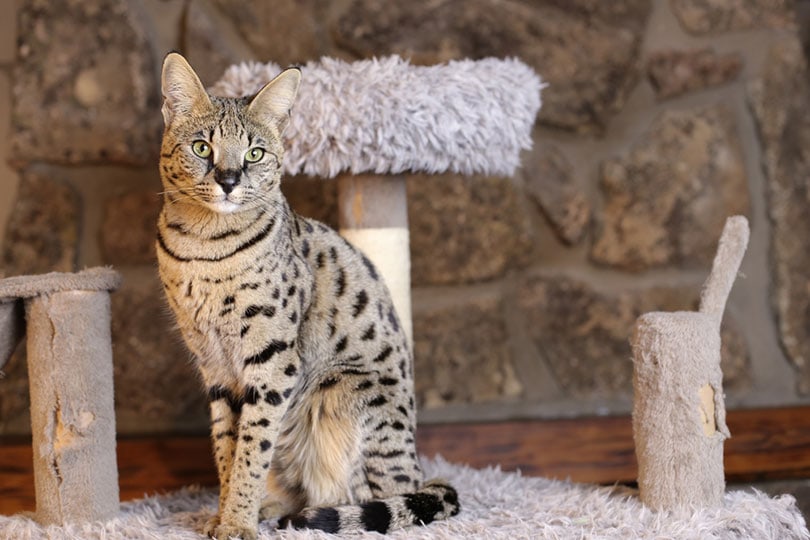
 Conclusion
Conclusion
Savannah cats are relatively healthy cats that can have longer lifespans. They’re an energetic and intelligent breed, so caring for their physical and mental needs can add years to their lives and increase their quality of life. Being mindful of its specific needs at different life stages can also help you better care for a Savannah cat and increase its likelihood of living a long and happy life.
Featured Image Credit: Lindasj22, Shutterstock


